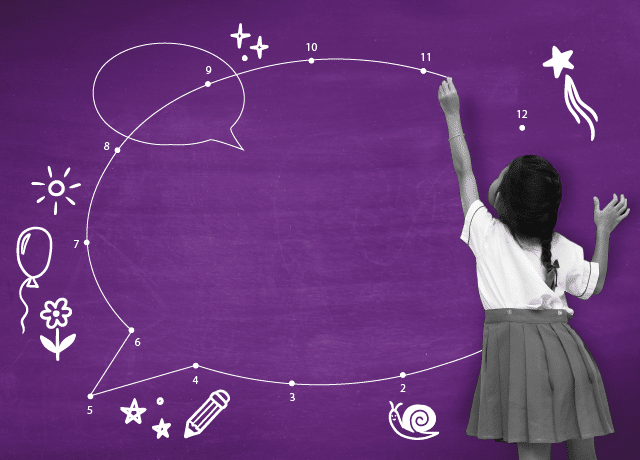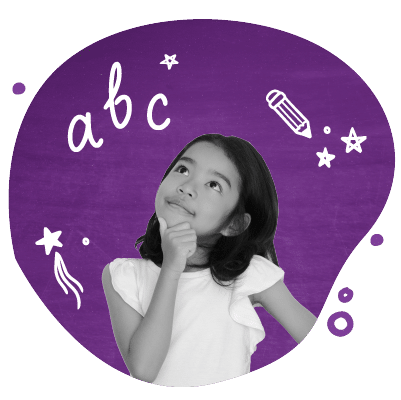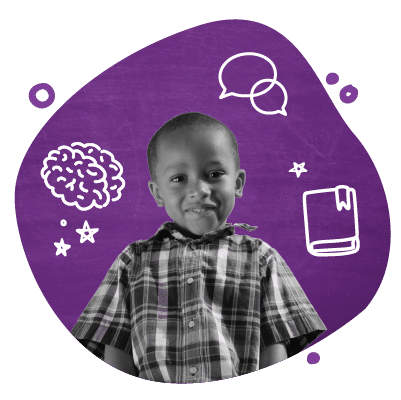You probably know third grade reading ability is a big deal, but do you really know why? According to one report, a child who’s struggling to read in third grade is four times less likely to earn a high school diploma. That’s the kind of stat that makes our LENA team (and maybe you, too) sit up and pay attention.
It turns out, third grade reading proficiency has connections to kindergarten readiness — and even early childhood education — in ways you might not expect.
The thing is, children don’t just wake up one day in third grade ready to tackle “Charlotte’s Web.” It’s a journey that starts much earlier. From adorable babbling in infancy to the inquisitive “Why?” phase in toddlerhood, children develop key language skills. Then come those preschool years when everything’s an adventure.
That’s where early childhood education (ECE) plays such an important role. Quality learning experiences in preschool and child care don’t just keep children busy — they set the stage for reading success down the road.
By third grade, we expect kids to shift gears from learning to read to reading to learn. It’s a big jump, and it affects everything they do in school. That’s why what happens in those early years, from the first cuddles to the last day of second grade, is so pivotal.
Third Grade Reading: The Academic Turning Point
When we talk about “third grade reading proficiency,” we’re not just looking for children who can sound out words. Educators need to see children who can dive into a book, understand what’s happening, and make connections across subject areas. It’s like upgrading from training wheels to a full-fledged bike — suddenly, the whole neighborhood is open for exploration!
Third grade is when the rubber meets the road.
In fourth grade and beyond, textbooks get more complex, instructions get longer, and even math problems come with paragraphs of explanation. If a child’s still struggling with reading at this point, they’re not just falling behind in English-Language Arts class — they’re potentially falling behind in everything.
Beyond Third Grade Reading: Long-Term Impacts on Success
Now, let’s talk about the long-term effects. The Annie E. Casey Foundation dropped a bombshell in their report “Double Jeopardy: How Third Grade Reading Skills and Poverty Influence High School Graduation.” They found that kids who aren’t reading proficiently by third grade are four times more likely to drop out of high school. Four times! That’s a seriously eye-opening statistic.
But it doesn’t stop at graduation. The National Institutes of Health concluded that reading ability is a critical factor in finding success in the job market. We’re talking about everything from job prospects to earning potential. It also affects a child’s future physical health. That same study shows that low literacy levels are directly associated with adverse health outcomes.
So, when we focus on third grade reading, we're not just thinking about the next book report. We're laying the groundwork for a child's entire future.
But there’s good news: We’re not powerless. In fact, there’s a lot we can do to set children up for reading success, starting way before they hit third grade. That’s where early childhood education and kindergarten readiness come into play. These early years are crucial in building the foundation for starting school strong. And, as we’ve read, being kindergarten ready plays a part in a child’s third grade reading skills. Let’s look at how early childhood education experiences can make all the difference in a child’s reading journey.
Early Childhood Education: Planting the Seeds Through Early Literacy and Language Development
Building Brains and Vocabularies
So, what makes an ECE program really stand out? It’s all about back-and-forth conversations and positive interactions. It’s about classrooms (and homes) buzzing with chatter and caregivers who turn every moment into an opportunity for interaction and conversation.
These daily interactions build early literacy skills and lay the foundation for kindergarten readiness. And, in turn, kindergarten lays the groundwork for third grade reading success!
The idea is not about cramming children’s heads with vocabulary or forcing academic skills onto them. In early childhood education classrooms, it’s all about responsive teacher-child interactions. Effective ECE programs are like a total workout for growing brains. They’re building those cognitive muscles — you know, problem-solving, memory, and attention skills. Because being able to pay attention and take turns is important when learning anything.
How Early Childhood Education Paves the Way
Now, you might be wondering, “How does all this ECE stuff translate to nailing that third grade reading benchmark?” Great question! Early childhood education is the foundation for reading success.
Educators and caregivers may be busy laying down those pre-literacy skills. But the real magic isn’t just about teaching skills. It’s about lighting a spark. The best programs don’t just teach kids how to read. They make kids want to read.
As a reminder, early learning isn’t just about academics. It’s about developing the whole child. The path to kindergarten readiness and eventually to third grade reading ability requires attention to multiple developmental domains. Children who enter kindergarten ready to learn — cognitively, socially, emotionally, and physically — are better positioned to become proficient readers by third grade.
Additionally, children who attend high-quality preschool are more likely to graduate high school, and the connection between 3rd grade reading and high school graduation disproportionately affects children of color and children living in poverty, as per the Casey Foundation report.
So, while we’re focused on that third grade reading goal, remember, the journey starts way earlier. Those ECE years set the stage for reading success and so much more. But how do we keep that momentum going once kids hit elementary school? Glad you asked — let’s talk about bridging that gap between early childhood and third grade success.
Bridging ECE to Third Grade Reading
Continuous Skill Development: Building on Strong Foundations
High-quality early childhood education sets the stage, but progress must continue, right? As children move from the early years to kindergarten to third grade, their skills need to evolve continuously. Recognizing speech sounds turns into complex phonics skills, while early story comprehension transforms into the ability to analyze more challenging texts.
This continuity is pivotal. It’s extremely difficult for children to catch up if they fall behind early on. To prevent these lags, educators and families must work together to reinforce and build upon existing skills consistently. You can learn more about how this is all connected here!
The Power of Interactive Talk: More Than Just Chatter
Remember those language-rich environments we talked about? Adult-child interactions early in life, even in infancy, are such an important part of the equation. Interactive talk is a powerful tool for ongoing language and literacy development. As a matter of fact, the conversational turns connection to reading is backed up by research. One study from Columbia University, powered by LENA technology, found that more back-and-forth conversations with children can lead to enhanced brain development and better reading outcomes.
By focusing on quality back-and-forth exchanges, we boost vocabulary, improve comprehension, and strengthen overall language skills. This approach is particularly beneficial for bilingual learners. Rich conversations in any language lay a strong foundation for reading skills, supporting overall literacy development.
Professional Development: A Major Player in Bridging the Gap
Professional development for early childhood educators is a powerful tool, directly affecting short- and long-term outcomes of young children. This is particularly true for the journey from early childhood to third grade! As education constantly evolves, ongoing learning for teachers is essential to provide the best support for young and future readers.
Ongoing professional development also promotes more high-quality teacher-child interactions. These are critical to the learning and behavioral engagement of children birth-to-5 before they reach elementary school.
Effective professional development programs for early childhood educators focus on:
- Enhancing language and literacy instruction techniques.
- Engaging educators and empowering them to create positive changes in their classroom.
- Implementing evidence-based practices for supporting diverse learners.
- Improving assessment and progress monitoring skills.
When educators grow, children thrive. And the impact of that extends far beyond the classroom.
By combining continued skill development, collaboration between educators and families, and language-rich environments with ongoing professional development for educators, we’re creating a seamless support system that extends from early childhood through third grade and beyond. The key lies in sustained effort, innovative approaches, and a commitment to supporting each child’s unique journey from birth onward.
At LENA, we’re committed to supporting this journey through innovative approaches to increase interactive talk and improve early literacy outcomes. Our programs and technology offer data-driven insights to educators and caregivers alike.
Want to learn more about how we’re transforming early childhood education and paving the way for reading success? Explore our professional development program and cutting-edge technology. Together, we can ensure third grade reading confidence for every child!











One Comment on “Connecting the Dots Between Early Childhood Education and Third Grade Reading”
In the world of high stakes testing, we are often forgotten. This is an empowering article for early childhood educators. We are not the afterthought by the foundation.